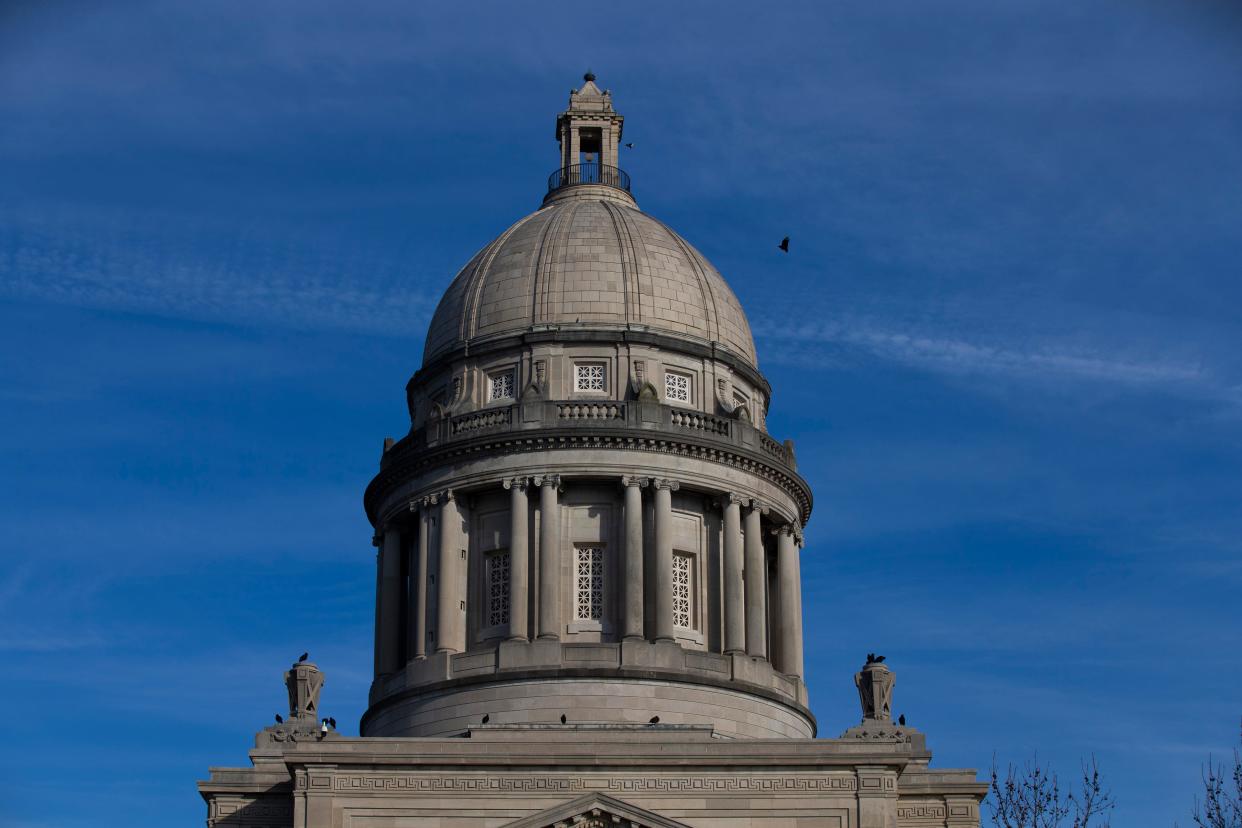Kentucky Supreme Court rules abortions will stay banned until lawsuit is decided

Abortion will stay almost completely banned across Kentucky, at least for now, after the state Supreme Court ruled Thursday that the commonwealth's near-total "trigger" ban on the procedure and its prohibition on abortion after about six weeks of pregnancy can remain in effect while a related lawsuit is considered.
That means abortion remains illegal in the commonwealth, with exceptions only for life-threatening health risks. However, the justices' ruling left open the possibility that a court could nix the trigger law if the broader lawsuit against it, which two Louisville abortion providers filed last summer, succeeds.
The Kentucky Supreme Court based Thursday's long-awaited decision largely on whether Planned Parenthood and EMW Women's Surgical Center in Louisville had legal standing to challenge the trigger law and six-week abortion ban.
The abortion providers are prohibited from offering abortions right now and argue that both bans violate their patients' rights under the Kentucky Constitution. However, the Supreme Court determined Planned Parenthood and EMW "do not have third-party standing to assert the constitutional rights of their patients."
“We are acutely aware that abortion is perhaps the most polarizing and difficult issue we face as members of this court, this commonwealth, and this country," the court said in Thursday's majority opinion, written by Justice Debra Hembree Lambert. "But we must honor separation of powers and act only when the constitution permits."
The court pointed out a patient still could directly challenge the constitutionality of these abortion bans.
"To be clear, this opinion does not in any way determine whether the Kentucky Constitution protects or does not protect the right to receive an abortion, as no appropriate party to raise that issue is before us," the decision said.
The court decided to keep these two abortion bans in place after hearing arguments Nov. 15 over whether it should reinstate a temporary injunction Jefferson Circuit Judge Mitch Perry issued in July that said those restrictions should stay suspended until the full case is decided.
The Supreme Court ruled Planned Parenthood and EMW do have first-party standing to challenge the trigger law on their own behalf as abortion providers, but not to challenge the six-week ban. And it determined an injunction temporarily blocking the trigger law still wasn’t merited based on relevant legal considerations.
It's sending the broader lawsuit back to Jefferson Circuit Court, which then can weigh whether the trigger law is unconstitutional based on the abortion providers' "first-party constitutional claims."
Attorney General Daniel Cameron, a Republican running for governor, is defending the trigger and six-week bans, which the GOP-led legislature passed in 2019. He praised Thursday's ruling, saying in a statement:
“We are very pleased that Kentucky’s high court has allowed these laws to remain in effect while the case proceeds in circuit court. This is a significant victory, and we will continue to stand up for the unborn by defending these laws.”
Leaders from Planned Parenthood Federation of America, the ACLU and the ACLU of Kentucky issued a statement on the plaintiffs' behalf that criticized the court's decision.
“Once again, the Kentucky Supreme Court failed to protect the health and safety of nearly a million people in the state by refusing to reinstate the lower court order blocking the law," they said in a statement. "Even after Kentuckians overwhelmingly voted against an anti-abortion ballot measure, abortion remains banned in the state. We are extremely disappointed in today’s decision, but we will never give up the fight to restore bodily autonomy and reproductive freedom in Kentucky. This fight is not over."
What events led up to this court ruling?
Kentucky's trigger law and six-week abortion ban became effective after Republican-appointed justices on the U.S. Supreme Court reversed the 1973 Roe v. Wade ruling last June and eliminated a nationwide right to abortion.
Planned Parenthood and EMW quickly challenged both bans in court. July's Jefferson Circuit Court ruling temporarily suspended those bans, but state appeals Judge Larry Thompson nixed that injunction in early August.
Kentucky abortion amendment:How did Kentucky vote on the abortion amendment? These maps tell the story
The issue was then kicked to the Supreme Court. The high court did not hear the case until after the November election, when Kentucky voters defeated the proposed Constitutional Amendment 2, which would've changed the state constitution to explicitly say it doesn't protect a right to abortion.
That failed constitutional amendment could've doomed the lawsuit filed by Planned Parenthood and EMW, but voters' rejection of Amendment 2 ensured the case could continue.
In Thursday's ruling, Lambert wrote that the Jefferson Circuit Court "abused its discretion by granting the abortion providers’ motion for a temporary injunction" against both abortion bans.
Reporter Joe Sonka contributed to this article. Reach reporter Morgan Watkins at mwatkins@courierjournal.com. Follow her on Twitter: @morganwatkins26.
This article originally appeared on Louisville Courier Journal: Kentucky Supreme Court ruling maintains state's abortion bans

